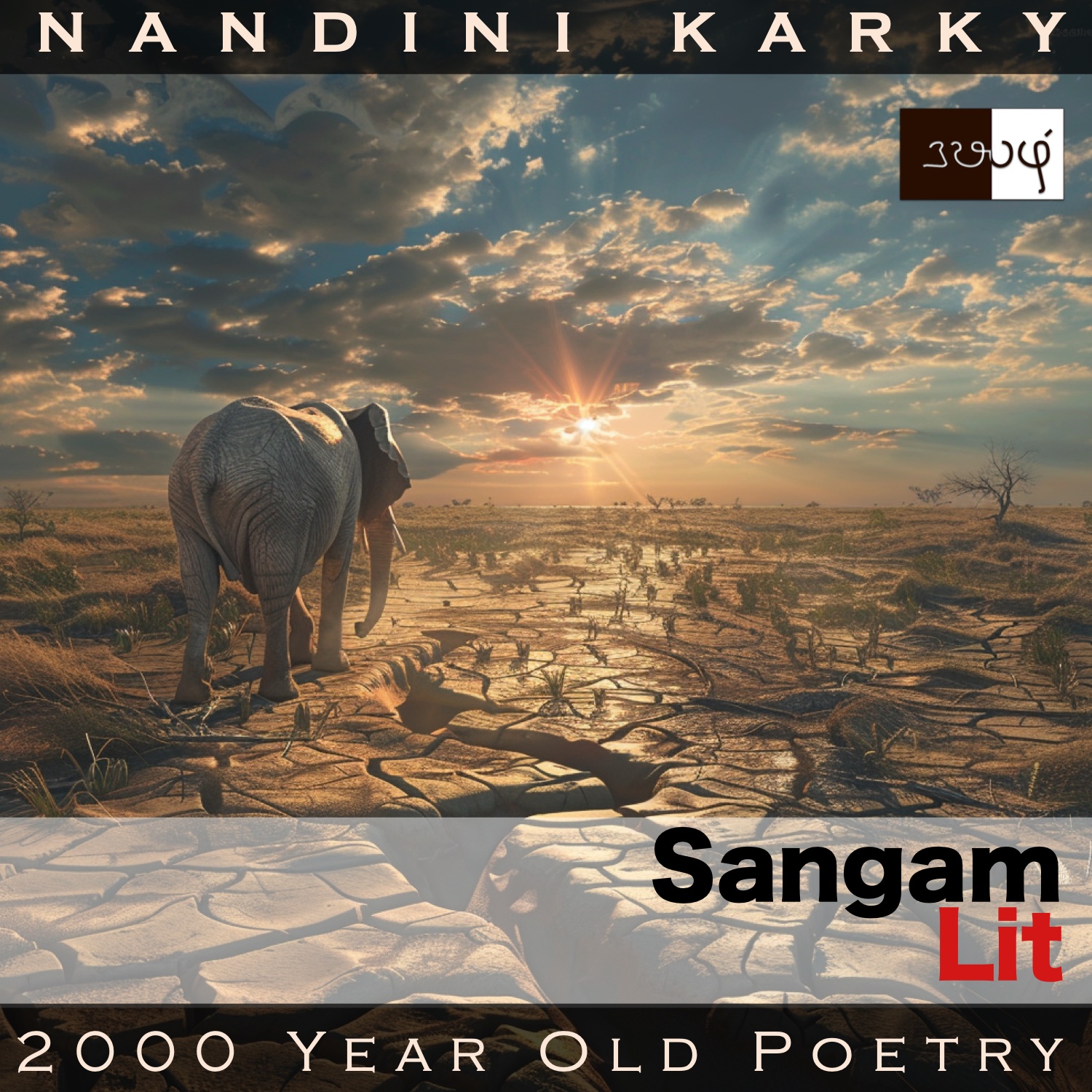Podcast: Play in new window | Download
Subscribe: Apple Podcasts | Spotify | Amazon Music | Android | iHeartRadio | TuneIn | RSS | More
In this episode, we listen to a piercing question put forth, as portrayed in Sangam Literary work, Kalithogai 7, penned by the Chera King Paalai Paadiya Perunkadunko. The verse is situated in the ‘Paalai’ or ‘Drylands landscape’ and narrates the consequences of the man’s preparations to part away.

வேனில் உழந்த வறிது உயங்கு ஓய் களிறு
வான் நீங்கு வைப்பின் வழங்காத் தேர் நீர்க்கு அவாஅம்
கானம் கடத்திர், எனக் கேட்பின், யான் ஒன்று
உசாவுகோ ஐய! சிறிது?
நீயே, செய் வினை மருங்கில் செலவு, அயர்ந்து, யாழ நின்
கை புனை வல் வில் ஞாண் உளர்தீயே;
இவட்கே, செய்வு உறு மண்டிலம் மையாப்பது போல்,
மை இல் வாள் முகம் பசப்பு ஊரும்மே
நீயே, வினை மாண் காழகம் வீங்கக் கட்டி,
புனை மாண் மரீஇய அம்பு தெரிதியே;
இவட்கே, சுனை மாண் நீலம் கார் எதிர்பவை போல்,
இனை நோக்கு உண்கண் நீர் நில்லாவே
நீயே, புலம்பு இல் உள்ளமொடு பொருள்வயிற் செலீஇய,
வலம் படு திகிரி வாய் நீவுதியே;
இவட்கே, அலங்கு இதழ்க் கோடல் வீ உகுபவை போல்,
இலங்கு ஏர் எல் வளை இறை ஊரும்மே
என நின்,
செல் நவை அரவத்தும் இனையவள் நீ நீப்பின்,
தன் நலம் கடைகொளப்படுதலின், மற்று இவள்
இன் உயிர் தருதலும் ஆற்றுமோ
முன்னிய தேஎத்து முயன்று செய் பொருளே?
We continue to be in the domain of a confidante’s persuasion, asking the man not to part away. The verse can be translated as follows:
“In that place, which the clouds have abandoned, a fatigued elephant, which has lost its strength in the heat of summer, seeks with desire the illusory water in the mirage. You want me to tell her that such is the forest you wish to cross. Before that, can I ask you about a little something, O lord?
When you, with thoughts about your journey to gather wealth, stroke the strings of your strong hand-carved bow, akin to the well-made moon shrouded by clouds, her flawless, shining face becomes covered with pallor!
When you, tying the well-stitched glove with a bulge on your hand, check the strength of the well-carved arrow, akin to blue-lilies in the springs facing the rains, in her kohl-streaked eyes, the tears stop not!
When you, wanting to part away to gather wealth with no worry in your heart, rub the mouth of your victorious chariot wheel, akin to the falling flowers of a white glory lily plant with swaying petals, her beautiful and shining bangles cross past her wrists and slip away!
And so, she feels so much distress just seeing your preparations to part away. If you actually do part away and her health and life ends utterly, will her sweet life be brought back by the wealth you gain, with much effort in that country you are parting away to?”
Let’s explore the details. The verse is situated in the context of a man’s parting away from his lady, after marriage, with an intention to seek wealth. When the man conveys this intention to the lady’s confidante, she says these words to him. The confidante, following the custom of describing the drylands, now paints a picture of how a thin and tired elephant, confused by its thirst and starvation, in that place which has not seen rains in ages, mistakes a mirage for water, and tries to drink up the nothingness. Such is the arid spread of the drylands, where the man says he wants to leave, the confidante relates. Now she turns to him and says, ‘You want me to go tell this to the lady. Before I do that, I have something to ask you.’
Following the three-step playbook of narrating incidents we have seen thus far in Kalithogai, the confidante presents three scenes in the man’s household in quick succession. First, we see the man testing his well-made bow, checking how taut the strings are. The lady happens to catch a glimpse, and just like how clouds cover the face of the radiant moon, pallor shrouds her glowing face, seeing this, the confidante says. Scene 2, the man is now wearing a glove which bulges over his hand and he holds the arrow in it, testing his comfort with his weapon. As in the previous case, when the lady happens to see this, like how water droplets shed unceasingly from blue-lilies in the rain, the lady’s eyes unceasingly shed tears. Final scene, the man is now cleaning his chariot wheels and perhaps rubbing it with some oil. And now, just the way the flowers of a white glory lily fall away in time, the lady’s bangles slip away and fall! Instantaneous slimming treatment for Sangam ladies seems to be to get an inkling of their husbands’ parting away!
Returning, the confidante remarks to the man, ‘You are just making preparations and already she’s under so much stress. Tell me something: If you do part away and she dies, will the wealth you gain, by your going away, bring her back?’ Again, this appears to be a severe threat of life loss to prevent the man from doing what he wants to do! A moment to connect back to the first image of that elephant rushing to quench its thirst in a mirage. Now, we understand the confidante has sketched that scene to imply the futility of the man’s quest for wealth. He will not find the satisfaction he’s looking for, for all will be lost when the lady’s lost!
Which brings us to the question of why did the Sangam folks give so much importance to this common occurrence of parting. When you compare this with most of the classics from this period, those seem to dwell on heroism, war and fantastical journeys of men. But Sangam literature dwells on the domestic domain of togetherness and love. Could this be because this was a settled society in which migration and war was alien, something that happened because of recent changes to their world? Could this be why they focused so much on this taken-for-granted event of parting away? Questions to ponder upon when understanding the history and society of these ancient people!




Share your thoughts...